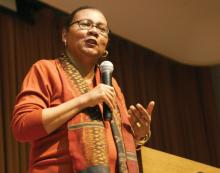The wide-ranging intellect of Black feminist thinker bell hooks (1952-2021) has inspired generations of students in Gender, Women & Sexuality Studies classrooms—through her words as a poet and theorist, cultural critic and healer, teacher and friend. Her death at the end of 2021, amid a prolonged season of planetary loss, cut deep. We remember her life with love, as “an action and an intention,” and continue to learn from the wild profusion of thought she offered up to so many.
On Killing Rage & Showing Up
The 2022 National Women’s Studies Association (NWSA) annual conference, “killing rage: resistance on the other side of freedom,” draws its title from killing rage: Ending Racism, a 1995 collection of essays by bell hooks. This first in-person gathering in over two years will feature multiple sessions that honor and think with the legacy of bell hooks. At a recent NWSA meeting of program directors and department chairs, Stephanie Troutman Robbins (University of Arizona) shared, in a keynote on “feminist pragmatism,” her reflections on what it meant to lose bell hooks as a mentor and a friend. For her, moving with and through grief has involved, holding on to the question of how we think about feminism in our lives, how we show up kinfully, and how we use theory and wisdom practically. Dr. Troutman Robbins recalled that when she was a faculty member at Berea College, bell hooks’ house, where she gathered friends for a weekly meeting of “group,” was one of the greatest classrooms. “Are you coming to group?” served as bell hooks’ reminder that what mattered was showing up and committing to what you could at that moment.
All About Love
Cricket Keating offers this memory of bell hooks:
I had the great luck, pleasure, and honor to be Dr. hooks’ colleague at the Department of Women’s, Gender, and Sexuality Studies at Ohio State University when she served as a visiting distinguished professor there from 2010-2013. During that time, she would visit our department for several weeks each year and would facilitate lectures and dialogues with students, faculty, and staff across the university. Her presence in the department and in our lives was electrifying and deeply transformative. She was a cherished colleague and friend. Her words on grief have kept me company in the wake of her loss:
“To be loving is to be open to grief, to be touched by sorrow, even sorrow that is unending. The way we grieve is informed by whether we know love…Given that commitment is an important aspect of love, we who love, know we must sustain ties in life and death. Our mourning, our letting ourselves grieve over the loss of loved ones is an expression of our commitment, a form of communication and communion” (All About Love, 198).
In her work, she left us so many treasured gifts and ways to continue communicating and communing with her. She writes in Teaching to Transgress that “theory emerges from the concrete, from my efforts to make sense of everyday life experiences, from my efforts to intervene critically in my life and the lives of others” (70). For hooks, theorizing takes place in the classroom, in community meetings, around the dinner table, on the phone, in the hallways—it takes intention, commitment to the possibility of each other’s liberatory self, honesty and humor. I feel her presence (and hear her wonderful laugh) each time I theorize with others in the way she both valorized and beautifully modeled in her life.
Honoring the Immeasurable
An upcoming special issue of Feminist Pedagogy is organized on “Honoring the Immeasurable: bell hooks’ Feminist Pedagogy in Teaching.” It will feature an article by Regina Yung Lee, co-authored with Laura T. Irwin (UW Communication) and Laura E. Irwin (ESOL Gaithersburg), titled “Teaching Language for Possibility, Not Assimilation: Using bell hooks in the English as a Second Language Classroom.” In analyzing hooks’ pedagogical thought alongside decolonial theory, they propose that “hooks provides a model of praxis for framing the ESOL classroom and knowledge producers that expands toward decolonial thought, especially within a history of religious coloniality.”
UW Conversation with Bell Hooks
On March 3, 2005, bell hooks gave a UW Graduate School Public Lecture. You can watch a video recording of the lecture here: https://www.youtube.com/watch?v=gDRP2F4JXE0&t=639s
